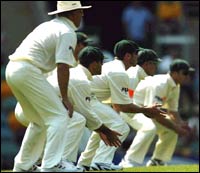Australia, Hayden just too good
Daniel Laidlaw
At the end of one Test, the stark reality is that England are not much
closer to cracking Australia than they have ever been these past seven
series. For interest's sake, it would be convenient to believe that England
have improved to such an extent that the outcome is in some doubt, and one
senses that for the sake of the series there are more than a few people
willing it to be so. But it simply isn't true, and there do not appear to be
any exciting revelations to make in this regard either in the immediate or
foreseeable future.
As Nasser Hussain said, it's still a contest of basic skills, and Australia's are plainly far better. They are so well-practiced, match-proven and
time-tested that the disparity can often seem greater than it actually is,
like on day four when they had unstoppable momentum. It wouldn't have been
immediately credible that it was the same contest Vaughan, Trescothick and
Butcher took up so well on day two, but that's the benefit of confidence,
position and experience. Australia have won innumerable times in the fashion
they did on the fourth afternoon that they expect it, and their opponents
know they expect it. It is a matter of self-belief, allied to magnificent
skill and execution.
England actually won day two, comfortably, but were so comprehensively
beaten on the other three days it did not matter. Playing from so far
behind, too, meant they would have needed more of the same for the rest of
the match.
 In any away series you've got to start well, particularly in Australia,
otherwise the confident, optimistic pre-series words soon become hopeless
platitudes. Shaun Pollock provided a glaring example of that last season.
Fortunately, Hussain is nothing if not gritty and combative, never appearing
to get too far ahead of himself in his team's aims and objectives, so
England should stay relatively grounded. But their task just got
immeasurably harder, and observers will now be less inclined to take any
positive emphasis seriously.
In any away series you've got to start well, particularly in Australia,
otherwise the confident, optimistic pre-series words soon become hopeless
platitudes. Shaun Pollock provided a glaring example of that last season.
Fortunately, Hussain is nothing if not gritty and combative, never appearing
to get too far ahead of himself in his team's aims and objectives, so
England should stay relatively grounded. But their task just got
immeasurably harder, and observers will now be less inclined to take any
positive emphasis seriously.
England's challenge centred on Vaughan and Trescothick and to a lesser
extent Butcher and Hussain himself, the top four. It's old ground now, but
they needed to stamp themselves on the series first. Hussain had the courage
to admit he read the wicket wrong and that his decision to bowl first was a
poor one, though he could hardly have said otherwise without being
lambasted. A bad error of judgement before play even starts is not the way
to start a winning series.
Anyway, Vaughan and Trescothick showed in the first innings that they have
the attitude and approach to have productive series, but that England will
likely rely heavily on them. After McGrath broke through on day two,
Gillespie shook up England with the second new ball, and it's difficult to
see anyone from Stewart downwards lasting a degree of time against any
combination of McGrath, Gillespie and Warne unless the top order has done
the major share of the work.
Michael Vaughan embraced his role as McGrath's target for the series and
decisively lost the first contest. In the first innings he nicked one that
seamed back dramatically and in the second was trapped in front in the first
over by one that also came back appreciably, albeit likely passing over the
stumps. With Trescothick edging Gillespie's angled delivery across him, the
openers were dismissed for just one run between them and two hours later
England were all out. One way or another, it seems that England's fortunes
revolve around them.
Gillespie, after an apparent recurrence of his calf complaint, performed
like a quintessential strike bowler, and was worth more than his three
wickets for the game. Hussain and Crawley added 97 for the fourth wicket on
day three, and England had reached 268/3 in the second session when
Australia took the second new ball. With McGrath below his peak, Gillespie
shook off the concerns over his fitness to generate good pace and bounce in
a hostile spell that saw him blast out Hussain and Stewart in the space of
two overs, opening up the lower order for the others. Then in the second
innings, he found Trescothick's edge in his first over and would have had
Hussain caught behind as well but for an umpiring mistake. He maintains the
sharp edge of Australia's attack.
Hussain must have been watching his New Zealand tapes, for he tried to leave
as much as he could on Sunday. Eventually, though, he was forced into
fending one from McGrath, after which England veritably hurtled to defeat.
In a near-instant, they were a catastrophic 5/35 - Crawley, run out by an
ecstatic Gilchrist after Langer's diving stop and relay; and Stewart,
furthering his poor record against Australia, top-edging a cut off Warne
into a blessed Hayden at second slip, who held the rebound. Compounding the
ignominy of a pair, Stewart was struck on the shoulder as the
exultantly-flung ball came down to earth.
England were never going to survive four days then, for once Australia had
the momentum, it was impossible to check. Before they began trampling some
teams in three days, this was the way Australia used to win Tests.
 The first Test also saw Matthew Hayden, who Steve Waugh claims is "batting
as well as anyone has ever batted in the history of the game", do his best
to live up to his captain's bold remarks. In near-unstoppable form, Hayden's
judgement remained impeccable as he continued to feed his voracious appetite
for runs, totalling 300 on his home ground while becoming the fourth
Australian to score a hundred in each innings of an Ashes Test. For an
opening batsmen, Hayden rarely seems to get caught behind the wicket or even
beaten outside off, and his dismissals are invariably a case of getting
himself out. No batsman has been more imposing at Test level in the past 12
months and with 11 hundreds in 34 Tests, including eight in his last 13, he's on the way to greatness.
The first Test also saw Matthew Hayden, who Steve Waugh claims is "batting
as well as anyone has ever batted in the history of the game", do his best
to live up to his captain's bold remarks. In near-unstoppable form, Hayden's
judgement remained impeccable as he continued to feed his voracious appetite
for runs, totalling 300 on his home ground while becoming the fourth
Australian to score a hundred in each innings of an Ashes Test. For an
opening batsmen, Hayden rarely seems to get caught behind the wicket or even
beaten outside off, and his dismissals are invariably a case of getting
himself out. No batsman has been more imposing at Test level in the past 12
months and with 11 hundreds in 34 Tests, including eight in his last 13, he's on the way to greatness.
PS: Bowling the first over after lunch on day three, Darren Lehmann was
caught on camera running his fingernail around the seam of the ball,
apparently in near-identical fashion to Tendulkar in the second Test against
South Africa last year. It drew brief comment from Messrs Benaud and Greig
in the Channel 9 commentary box and at the start of the following over
umpire Steve Bucknor appeared to address Lehmann about his actions, with no
immediate consequences. Whether match referee Wasim Raja takes any action,
or it was deemed to be legitimate, remains to be seen.
More Columns
Mail Daniel Laidlaw